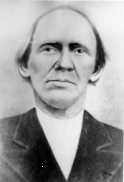William Green Wells
WILLIAM GREEN WELLS was born in Scott County, Virginia, in 1818, the son of Revolutionary veteran Richard Wells and his wife Susannah Hutchison. About 1830, he moved with his parents to Johnson County, Kentucky, and settled on Greasy Creek. In 1839, he married to Mary Butcher, also a native of Scott County, Virginia. A skillful trader, by 1860 he amassed over 5,000 acres of property and was recognized as one of Johnson County's wealthiest farmers. Additionally, William E. Connelley in his History of Kentucky described him as "a man of much professional ability as a physician and surgeon...besides giving equally earnest service as a local minister of the Methodist Church." He was also the founder of Wells General Store which later became Big Sandy Hardware Co., Inc.
Connelley also noted that Wells was a "staunch Democrat (who) was in sympathy with the cause of the Confederacy." Prior to the war, Wells served as 1st Lieutenant of the 3rd Company, 1st Battalion, of Johnson's County's Enrolled State Militia. But, on November 21, 1861, he resigned his commission and traveled with a group of local secessionists to Cedar Bluff, Virginia, where he enlisted in the Confederate Army for a 12 months term as a private in Co. E of the 54th Virginia Infantry. Soon afterward, the 54th moved into Kentucky and by January 1862 was camped in Johnson, County. Because of friction in the regiment between Kentuckians and Virginians, Wells deserted from the 54th on January 10, 1862, but joined Company E of the 5th Kentucky Infantry, C.S.A. on the very same day. Immediately, he was appointed his company's 5th Sergeant.
On January 10, 1862, Sergeant Wells took part in the Battle of Middle Creek in Floyd County, KY, and was captured in action. No records of his incarceration survives, but on September 12, 1862, he re-enlisted for a three year term in a new company of the 5th Kentucky Infantry. Almost immediately thereafter, this company was transferred to a new unit and became Co. F of Ficklin's Battalion of Kentucky Infantry.
After taking part in the Perryville Campaign, Wells was captured in action in Morgan County on November 7, 1862. Initially, he was transported to the Union P.O.W. camp at Louisville where the records erroneously indicate that he took the oath of allegiance. Actually, he was transferred to Camp Chase, Ohio, on November 29, 1862, where he remained until transported to Cairo, Illinois, for exchange on November 3, 1863. The 1863 Johnson County delinquent tax list records Wells as "in prison in Ohio - Rebble [sic]."
After his exchange, William Green Wells returned to Johnson County where he set about organizing his own Confederate cavalry company known as the "Greasy Creek Guards." In the early summer of 1864, the new company attached to May's 10th Kentucky Cavalry and Wells was commissioned as a Captain. Under the command of Gen. John Hunt Morgan, the company fought in Morgan's last Kentucky raid. After the disastrous battles of Mt. Sterling and Cynthiana, the remnants of Wells' company returned to eastern Johnson County. In the early fall of 1864, the company affiliated with a new command of "border men" headed by Colonel William S. "Rebel Bill" Smith. This cavalry battalion, composed of Kentucky and Virginia mountain men, roamed the banks of the Big Sandy River creating havoc for area Unionists. Wells' company was identified in raids at Paintsville in November 1864. In December 1864, Smith's command was temporarily broken up and Wells and the rest of the company "consolidated" with Co. K of the newly formed 13th GA Cavalry on January 16, 1865. Wells company remained with the GA unit until it was disbanded on April 12, 1865, near Christiansburg, Virginia.
Soon after the surrender, Wells' company moved into Wayne County, West Virginia, where local Union authorities reported the company made a raid on local Unionists' farms. On May 11, 1865, Wells' company surrendered for a second time at Louisa, Kentucky. However, their service was not finished. Harassed by occupying Union troops in Johnson County, the Greasy Creek Guards rejoined Smith's Cavalry Battalion in Logan County, West Virginia, until the final surrender at Charleston, West Virginia, on June 12, 1865.
After the war, Captain Wells continued as a community leader, doctor, and Methodist minister. He was active in the Eastern Kentucky Confederate Veterans Society and was appointed by the Governor as a commissioner for the founding of Martin County. Most of all, Captain Wells remained an unreconstructed rebel. On March 19, 1866, a local Unionist complained to authorities that Wells was "hurrahing for Jeff Davis, defying everybody."
During the last years of his life, Captain William Green Wells lived quietly at his home in Paintsville. In 1887, no doubt sensing the end, he moved back to Greasy Creek where he died. The Wells Chapel Methodist Church, built during the last year of his life on Greasy Creek, is named in his honor. Captain William Green Wells is buried in the J. B. Wells Cemetery on Depot Road in Paintsville beneath a beautiful Confederate veteran's tombstone.
donated by Carolyn Chism
